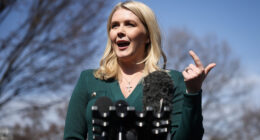If you haven’t been able to snag a morning coffee at your local Starbucks store in the past few days, you’re far from being the only customer experiencing the frustrating obstacle. Workers at more than 150 stores are currently on a weeklong strike which has disrupted operations at dozens of Starbucks cafes across the country.
Earlier this month, reports began emerging that managers at some Starbucks locations banned decorations that celebrated Pride Month. According to The New York Times, Starbucks Workers United, a union representing hundreds of locations, said that workers were either told to take down the colorful displays or were directed not to put them up in the first place, a departure in policy from earlier years.
In a statement late last week, the company denied that it made any changes to its corporate policies “as it relates to our inclusive store environments, our company culture, and the benefits we offer our partners.”
“We continue to encourage our store leaders to celebrate with their communities including for U.S. Pride month in June, as we always have,” added the statement, which was signed by Starbucks CEO Laxman Narasimhan and Sara Trilling, the executive vice president and president of Starbucks North America
Still, Starbucks Workers United, which has been leading a nationwide push to unionize Starbucks employees in recent years, claims the reported crackdown on Pride Month decor is the company’s latest act of “retaliation” against workers amid the unionization efforts. The group has also accused the company of conducting an “illegal union-busting campaign” and refusing to bargain fairly with union stores.
While Starbucks has repeatedly denied these allegations, judges have sided with the union in several instances where such claims have found their way into courtrooms. In March, for example, a National Labor Relations Board judge determined that Starbucks illegally monitored, disciplined, and fired some employees in Buffalo, N.Y., who were participating in union organizing and tried to curb union support, The New York Times reported. In a statement to the Times after this decision, Starbucks called the ruling “inappropriate” and said it was “considering all options to obtain further legal review.”
READ RELATED: Bursitis: Understanding The Role Of Inflammation Here Is Crucial For Effective Management
The current strikes kicked off on June 23 and are expected to last through June 30, according to a Starbucks Workers United press release. The striking workers are “demanding that Starbucks negotiate a fair contract with union stores and stop their illegal union-busting campaign, which has significantly impacted Starbucks’ LGBTQIA+ workforce.”
So far, they do seem to be making an impact. In an update posted on Twitter yesterday, June 26, Starbucks Workers United said they had disrupted operations at dozens of stores across the country “and we’re just getting started.”
But a Starbucks spokesperson said that the strikes have only had “limited effects” on its business, with an average of 12 stores closing each day from June 23 to June 26.
“Workers United continues to spread false information about our benefits, policies and negotiation efforts—a tactic used to seemingly divide our partners and deflect from their failure to respond to bargaining sessions for more than 200 stores,” the company said in a statement shared with Eat This, Not That! “We apologize to our customers who may experience an inconvenience at these locations and encourage customers to find any of our more than 9,000 stores open nearby using our store locator available online or through the Starbucks mobile app.”
Zoe Strozewski










